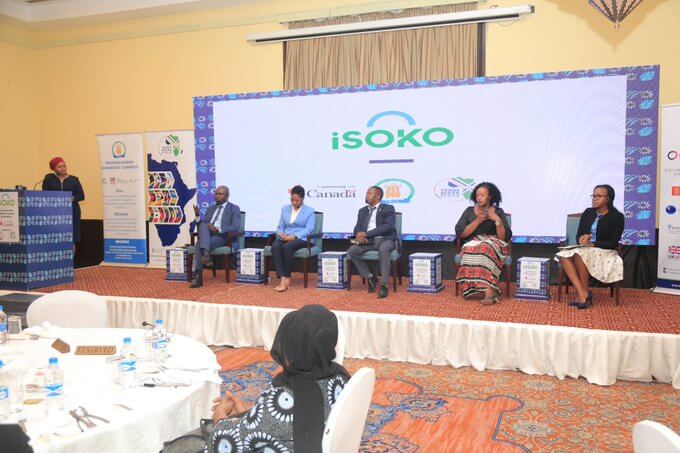
Our Projects are
Transforming African Trade
Quick Contacts
2nd Floor, Fidelity Insurance Centre Waiyaki Way, Westlands

LOCAL women entrepreneurs will now find it easier to sell their products in the domestic and regional markets after the launch of an online trading platform, iSOKO which is designed to support women in trade across East Africa.
The online platform was launched in Dar es Salaam on Wednesday by Tanzania Women Chamber of Commerce in partnership with TradeMark Africa (TMA) through the support of Global Affairs Canada
It enables women traders advertise and sell their products and services to customers in Tanzania and East Africa and provides access to different trade and regulatory information that relates to their businesses.
Already 3,000 women traders in Tanzania have registered in the platform and some have begun selling their products and services through the portal that can be accessed through a mobile telephone by downloading an iSOKO application, said Tanzania Women Chamber of Commerce, Executive Director, Mwajuma Hamza at the launching event.
The Director of Policy and Planning in the Ministry of Industry, Investment and Trade, Needpeace Wambuya, who was the guest of honour in the launching event, challenged TMA and TWCC to facilitate women entrepreneurs to capture the lucrative Democratic Republic of Congo market as well as that of South Sudan.
“If our women traders manage to capture the DR Congo market, the economy will rise more significantly,” said Mr Wambuya who had represented the Minister for Industry, Trade and Investment, Dr Ashatu Kijaji.
He said local women traders should take advantage of the online trading platform to access wider markets in Africa and grow.
“One of the challenges for women traders is lack of reliable market. iSOKO is going to solve this challenge. Many entrepreneurs have not been able to promote their products outside the country. This is an opportunity,” he said.
The government is more focused on promoting value-added exports of local products to benefit more in the regional and global trade and was helping local entrepreneurs in capacity building through various programmes.
He said the government would continue to improve the business environment to help businesses prosper, but local entrepreneurs need to formalize their businesses and pay taxes when needed.
“We should be patriotic to the country by formalizing our businesses and pay taxes when required. We must also make sure we build trust so that we can be relied on in trade,” he said,
TMA Country Director, Monica Hangi said they were focused to register 20,000 women traders across East Africa in the online platform and the registration of local women traders shows they were determined to explore the regional market.
“Our target was to register 20,000 women traders across Africa to be members of iSOKO. Up to now 3,000 women in Tanzania have registered. This is very encouraging that women traders in Tanzania want to conquer East Africa market.
The Counsellor for Development and Chief of Operations in the High Commission of Canada, Bronwyn Cruden expressed hope that the online trading platform would help women entrepreneurs to grow by accessing wider markets in Tanzania and the East African Community region.
“The impact of this digital platform will be transformational,” said Ms Cruden, noting that women who form the majority in informal trade can play a critical role to transform economies through intra-African trade.
A member of the East African Legislative Assembly from Tanzania, Dr Shogo Sedoyeka called on the local women traders to build trust in doing business and help to change the perspective that traders in Tanzania are “devious and untrustworthy.”
“That is our biggest challenge. We are being complained about that we are devious and untrustworthy. This platform will expose us on how we do trade. Trust in business is very important. My humble request is for women traders to help and change this perspective,” she said.
Read original article
Disclaimer: The views and opinions expressed in this article are those of the authors and do not necessarily reflect the official policy or position of TradeMark Africa.